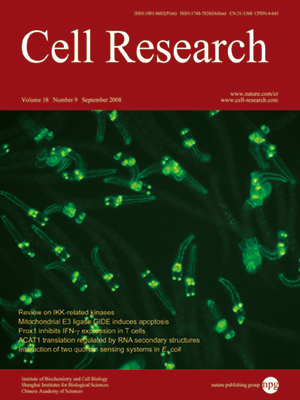
Volume 18, No 9, Sep 2008
ISSN: 1001-0602
EISSN: 1748-7838 2018
impact factor 17.848*
(Clarivate Analytics, 2019)
Volume 18 Issue 9, September 2008: 911-920
ORIGINAL ARTICLES
Repression of interferon-γ expression in T cells by Prospero-related Homeobox protein
Linfang Wang1,3, Jianmei Zhu1, Shifang Shan1,3, Yi Qin1, Yuying Kong1, Jing Liu2,4, Yuan Wang1 and Youhua Xie1,2,4
1State Key Laboratory of Molecular Biology, Institute of Biochemistry and Cell Biology, Shanghai Institutes of Biological Sciences, Chinese Academy of Sciences, Shanghai 200031, China
2Key Laboratory of Medical Molecular Virology, Institute of Medical Microbiology, Shanghai Medical College, Fudan University, Shanghai 200032, China
3Graduate School of Chinese Academy of Sciences, China
4Institute of Biomedical Sciences, Fudan University, Shanghai 200032, China
Correspondence: Youhua Xie(yhxie@sibs.ac.cn)
Interferon-gamma (IFN-γ) is a major proinflammatory effector and regulatory cytokine produced by activated T cells and NK cells. IFN-γ has been shown to play pivotal roles in fundamental immunological processes such as inflammatory reactions, cell-mediated immunity and autoimmunity. A variety of human disorders have now been linked to irregular IFN-γ expression. In order to achieve proper IFN-γ-mediated immunological effects, IFN-γ expression in T cells is subject to both positive and negative regulation. In this study, we report for the first time the negative regulation of IFN-γ expression by Prospero-related Homeobox (Prox1). In Jurkat T cells and primary human CD4+ T cells, Prox1 expression decreases quickly upon T cell activation, concurrent with a dramatic increase in IFN-γ expression. Reporter analysis and chromatin immunoprecipitation (ChIP) revealed that Prox1 associates with and inhibits the transcription activity of IFN-γ promoter in activated Jurkat T cells. Co-immunoprecipitation and GST pull-down assay demonstrated a direct binding between Prox1 and the nuclear receptor peroxisome proliferator-activated receptor gamma (PPARγ), which is also an IFN-γ repressor in T cells. By introducing deletions and mutations into Prox1, we show that the repression of IFN-γ promoter by Prox1 is largely dependent upon the physical interaction between Prox1 and PPARγ. Furthermore, PPARγ antagonist treatment removes Prox1 from IFN-γ promoter and attenuates repression of IFN-γ expression by Prox1. These findings establish Prox1 as a new negative regulator of IFN-γ expression in T cells and will aid in the understanding of IFN-γ transcription regulation mechanisms.
Cell Research (2008) 18:911-920. doi: 10.1038/cr.2008.275; published online 12 August 2008
FULL TEXT | PDF
Browse 2177


